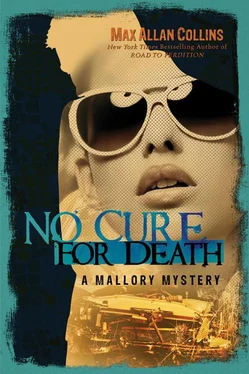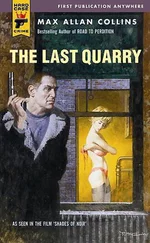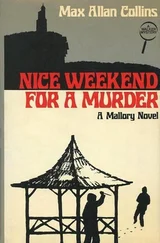Max Collins - No Cure for Death
Здесь есть возможность читать онлайн «Max Collins - No Cure for Death» весь текст электронной книги совершенно бесплатно (целиком полную версию без сокращений). В некоторых случаях можно слушать аудио, скачать через торрент в формате fb2 и присутствует краткое содержание. Год выпуска: 2012, Издательство: AmazonEncore, Жанр: Криминальный детектив, на английском языке. Описание произведения, (предисловие) а так же отзывы посетителей доступны на портале библиотеки ЛибКат.
- Название:No Cure for Death
- Автор:
- Издательство:AmazonEncore
- Жанр:
- Год:2012
- ISBN:нет данных
- Рейтинг книги:4 / 5. Голосов: 1
-
Избранное:Добавить в избранное
- Отзывы:
-
Ваша оценка:
- 80
- 1
- 2
- 3
- 4
- 5
No Cure for Death: краткое содержание, описание и аннотация
Предлагаем к чтению аннотацию, описание, краткое содержание или предисловие (зависит от того, что написал сам автор книги «No Cure for Death»). Если вы не нашли необходимую информацию о книге — напишите в комментариях, мы постараемся отыскать её.
No Cure for Death — читать онлайн бесплатно полную книгу (весь текст) целиком
Ниже представлен текст книги, разбитый по страницам. Система сохранения места последней прочитанной страницы, позволяет с удобством читать онлайн бесплатно книгу «No Cure for Death», без необходимости каждый раз заново искать на чём Вы остановились. Поставьте закладку, и сможете в любой момент перейти на страницу, на которой закончили чтение.
Интервал:
Закладка:
The lobby I was in was boxlike, and its ceiling went the building’s full two stories. The walls were smooth plaster, cream-colored, bare. A coatrack by the door was the only furniture, a tiny throw rug the only carpeting. The floors were well-varnished wood that yellowly reflected an overhead light. In the middle of the facing wall was an archway that cut through an otherwise enclosed hall.
I went over and stood within the hall. Its ceiling was as high as the lobby’s. I checked my bearings: beyond the archway was the living room-big, sparsely furnished, much like an extension of the lobby, with various large, oddly shaped, undraped windows. To my right was a steep incline of stairs, no rail, crowded by claustrophobically tight walls.
I climbed the stairway, palms scraping against the confining walls, and at the top of the stairs found a landing. On the left was a door. I turned the knob and found the door unlocked and pushed it gently open and stepped in.
The room encompassed the whole top floor. There was no carpeting, again only bare, but well-varnished wood. The walls, too, were bare, except in the middle on the left where an artificial fireplace with elaborate woodworking stood dark and absurdly out of place in this cream-walled context. An oil painting of a pontifically smiling, handsome man in a purple suit and tie hung over the mantel, and on the mantel in front of the Rockwell-style portrait was a single silver-framed photograph. Along the end wall, with its long window looking over the Mississippi, the floor was raised half a foot, like a stage, and center-stage was a battered desk, coming up to the sill. The back wall was relatively crowded: a door in either corner-one I’d just come in, the other to a bathroom, I presumed-and a bed. Its head was to the wall, with a cluttered nightstand on one side and a dresser on the other, a wheelchair in front of the dresser, and a portable television on a movable stand in front of that. The bed had a man in it.
The man said, “Well. Hello. I don’t believe we’ve met.”
He was old. The bedcovers were tucked up under his arms, which lay straight and limp in front of him like the limbs of a ventriloquist’s dummy. He was so old he was shrinking; the gray silk pajama top was sizes too big, a parachute he was lost in. The flesh of his hands was like parchment, and you could’ve stored things in the hollows of his cheeks. His hair was white and long, longer than mine, as though he didn’t bother having it cut anymore. Though the handsome cast of his features hadn’t been completely dimmed by time, the gray-blue eyes, once hypnotic and piercing, were milky and confused now.
“Hello, Mr. Norman,” I said.
“Do… should I know you, young man?” The voice was resonant and not as old as the rest of him. “That is, I don’t remember meeting you, but as you might guess, my mind is not all it once was.”
There was a chair by the nightstand. I pulled it around by the bed and sat down. “We haven’t met, sir,” I said. “Excuse me for barging in, but I needed to see you.”
He smiled, and in it you could imagine the masterful con man’s smile it had been; unlike his nephew Stefan’s, Simon Norman’s teeth were his own.
“I haven’t received many guests in the past few years,” he said. “But now, this particular moment, even an uninvited guest is welcome. It’s Thanksgiving evening, you know, and the kind of time best not spent alone. If one can’t share such times with relatives or friends, then a stranger will do. What was your name?”
“Mallory,” I said, and offered my hand.
He took it. His grip was firm, but the flesh around it seemed ready to jump ship. The eyes got a little brighter and he said, “You aren’t here to do me in, are you, Mallory? I didn’t swindle your mother, did I? Or would that be grandmother? Did I swindle your grandmother out of her hard-earned dollars and are you here for retribution for that misconduct?”
“No,” I said, “nothing like that.”
“I must confess, if you were on, well, a mission of vengeance, you’d’ve picked a good night for it. You’d have a willing victim, as I’ve been rather melancholy this evening.”
I nodded. “I understand.”
“No, you don’t,” he said, sitting up somewhat straighter in the bed. “You assume I mean guilt, don’t you? Well that’s not it, not at all. Oh, hell, it was wrong of me, wrong to charge so high when times were so tough back in my clinic days. I was wrong. I was wrong, I’m first to admit it. Can you deny that? Hmmm?”
“I guess not.”
“You know, I wasn’t the black villain you’d think I was, if you heard those politicians tell it. The way they talked, bringing Richard down with all of it, and distorting it besides… hell. I gave them a lot of comfort, do you know that? Many people had hope, thanks to me. In their final days, even their final hours, they had hope because of me. False hope, you might argue, but it was hope, whatever kind, and real enough to them.” He coughed. “You… you just try to put a price tag on that, try to say you can charge too much.” He coughed some more.
I grabbed a stack of tissues off the cluttered nightstand and handed it to him. He coughed into one, crumpled it and tossed it on the stand.
He said, “People thanked me, you know.”
I nodded.
“You don’t know, you weren’t born. Listen here, you see that desk back there? Back by the windows.”
I nodded.
“Go over there and look at the top of it. Go ahead!”
I got up and walked across the room and stepped up on the platform by the window and looked down at the desktop. Under glass were photographs, aging, of varieties of people in snapshot poses, all of them with personal notes written on them thanking Simon Norman. In the middle was a signed photo of Herbert Hoover: “Best wishes, Doc Sy!” All of the inscriptions but Hoover’s were in the same hand.
I walked back and sat down.
“What do you think of that?” he said.
“Impressive.”
“Are you surprised?”
“Yes, I am. You seem in better spirits now.”
He smiled and reached out and patted my shoulder. “I like having someone your age to talk to. You know, when you spend a holiday evening alone like this, it makes you reflective, makes you think on things-and people-that you’ve lost. My son, I lost my son, you know, did you know that? He might’ve been president one day. Before that May Belle, and now…”
“Now?”
“Say, did you look at the picture on the mantel?”
“No, I didn’t.”
“Go on over and look at it.”
I got up again and went to the fireplace and lifted off the silver-framed photo. The portrait in purple smiled down at me as I looked at the photo, a studio shot of a pretty young woman, in the thirties manner: plump face, wide bright eyes, rosebud mouth, dark tight curls.
“Your wife, Mr. Norman?”
“She was a dancer,” he said. His voice was soft now, as if in another room. “You never saw her feet touch the floor, that’s how she danced. I took some patients down to Miami that winter and she was dancing in a club. Not just the chorus line, mind you, she was featured. Everyone loved her, but it was me she came back with and married. Ah, you should have seen this place then. White fluffy carpet, all the latest furniture, mirrors everywhere. She liked mirrors. Over there was where the baby grand was, a white baby grand; I hired a fella to come in and play on it now and then so she could dance. Over against the wall there was the bar, and oh, it was stocked with everything, you wouldn’t believe… the funny thing is, she died of cancer, did you know that? Do you have any idea what it’s like to help others and not be able to help somebody you love?”
Читать дальшеИнтервал:
Закладка:
Похожие книги на «No Cure for Death»
Представляем Вашему вниманию похожие книги на «No Cure for Death» списком для выбора. Мы отобрали схожую по названию и смыслу литературу в надежде предоставить читателям больше вариантов отыскать новые, интересные, ещё непрочитанные произведения.
Обсуждение, отзывы о книге «No Cure for Death» и просто собственные мнения читателей. Оставьте ваши комментарии, напишите, что Вы думаете о произведении, его смысле или главных героях. Укажите что конкретно понравилось, а что нет, и почему Вы так считаете.












